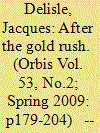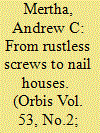|
|
|
Sort Order |
|
|
|
Items / Page
|
|
|
|
|
|
|
| Srl | Item |
| 1 |
ID:
086664


|
|
|
|
|
| Publication |
2009.
|
| Summary/Abstract |
Four months after the Beijing Olympics, on the vast plaza beside the games main venues, workers fought gusty winds and freezing temeratures to erect, incongruously, scores of artificial Chistmas trees while a handful of hawkers futilely pushed discounted memorabilia.
|
|
|
|
|
|
|
|
|
|
|
|
|
|
|
|
| 2 |
ID:
086666


|
|
|
|
|
| Publication |
2009.
|
| Summary/Abstract |
This article addresses property rights in China under four headings. I begin by placing the Chinese case within the larger context of property rights literature. The second section reviews the existing scholarship on property rights in China and identifies existing lacunae. The third section provides the broad contours of the contemporary Chinese intellectual and political discourse over property rights in China. And finally, I offer several cases of property rights that illustrate the variation in the scope of the concept of property rights in China and suggest possible avenues for future research.
|
|
|
|
|
|
|
|
|
|
|
|
|
|
|
|
| 3 |
ID:
086670


|
|
|
|
|
| Publication |
2009.
|
| Summary/Abstract |
The outcome of ongoing debates over the future of American military strategy will play a critical role in shaping the foreign and military policies of the United States over the next decade. Traditionalists worry about the shift towards emphasizing counterinsurgency (COIN) operations and irregular warfare, believing that the use of force is often ineffective in COIN situations and the American military should concentrate on planning for conventional war. In contrast, COIN advocates argue that the United States must focus its efforts on preparing for the wars it is most likely to fight, irregular wars.
|
|
|
|
|
|
|
|
|
|
|
|
|
|
|
|
| 4 |
ID:
086671


|
|
|
|
|
| Publication |
2009.
|
| Summary/Abstract |
Until recently, the British were considered to have an unusally high aptitude for counterinsurgency. In contrast with other major armies of the world, the British Army has a record of relative success in this for of warfare. In staff colleges worldwide when the syllabus turns to counterinsurgency it is C.E. callwell's work on small wars, as well as post war quasi-docrtinal British books by the likes of Robert Thompson and Frank Kitson, that form the canon
|
|
|
|
|
|
|
|
|
|
|
|
|
|
|
|
| 5 |
ID:
086669


|
|
|
|
|
| Publication |
2009.
|
| Summary/Abstract |
To form a more prudent foreign policy toward the Muslim Brotherhood, we must understand it not only as a domestic actor, but also as a major regional player. In fact, the Brotherhood has a complex relationship with Iran and the Shias, which blurs the lines of the so-called Shia Crescent. This article addresses the Muslim Brotherhood's foreign/regional policy by analyzing its attitude toward the Shias and Iran, thus placing it within the context of the emerging regional order. Addressing the complex relationship between the Muslim Brotherhood and the Shias/Iran will help to clarify the regional fallout were the Brotherhood to gain control of a major Sunni Arab state. This is a vital issue for policy makers who are considering the U.S. position vis-à-vis the Brotherhood.
|
|
|
|
|
|
|
|
|
|
|
|
|
|
|
|
| 6 |
ID:
086663


|
|
|
|
|
| Publication |
2009.
|
| Summary/Abstract |
According to a recent RAND report, the United States will not be able to defend Taiwan from Chinese military aggression by 2020. However, this study, like many others, raises more questions than it answers about the People's Republic of China's (PRC's) current defense posture. Is there a Chinese plan to claim Taiwan by force after 2020? In contrast to the conclusions of the RAND report, this article argues that China's strategic approach is not designed primarily for fighting a war over Taiwan, or over any other matter of critical interest to China, but to create a disposition of forces so favorable to Beijing that China will not need to fight a war.
|
|
|
|
|
|
|
|
|
|
|
|
|
|
|
|
| 7 |
ID:
086665


|
|
|
|
|
| Publication |
2009.
|
| Summary/Abstract |
China's relations with the West deteriorated dramatically following the Tibet and Olympic torch relay controversies in the spring of 2008. Because of its focus on the balance of material power, realist International Relations theory can do little to help us understand such developments. Instead, it is the political psychology of international relations that provides the most leverage on the role that misperceptions play in generating mistrust and insecurity in U.S.-China relations.
|
|
|
|
|
|
|
|
|
|
|
|
|
|
|
|
| 8 |
ID:
086668


|
|
|
|
|
| Publication |
2009.
|
| Summary/Abstract |
The conventional wisdom recommends the establishment of a Palestinian state to bring about an end to the Israeli-Palestinian conflict (the two-state paradigm). This article first reviews the confluence of domestic and international factors that led to the resurgence of the two-state paradigm. Next, it concludes that a peaceful outcome in accordance with this paradigm is unlikely to emerge in the near future: the two national movements, the Palestinian and the Zionist, are not close to a historic compromise, and the Palestinians are not able to build a state. Finally, the article analyzes the policy options available to policymakers. State-building is unlikely to succeed. Similarly, a binational state, where Arabs and Jews live peacefully together is not within reach. A regional approach that advocates a greater role for Arab states in Palestinian affairs has better chances of stabilizing the situation than the previous options. Finally, in the absence of a solution, the most realistic policy appears to be conflict management.
|
|
|
|
|
|
|
|
|
|
|
|
|
|
|
|
| 9 |
ID:
086667


|
|
|
|
|
| Publication |
2009.
|
| Summary/Abstract |
As India seeks to become a major player on the international political stage, it will face two major internal constraints. First, India will have to recognize the need to exploit the extant structure of international system to its advantage more effectively. Structural constraints are the most formidable ones a state encounters in its drive towards the status of a major power. Yet, Indian foreign policy continues to be reactive to the strategic environment rather than attempting to shape the strategic realities. While such an ad hoc response to the structural imperatives carried little costs when India was on the periphery of global politics, it holds grave risks now that India seems poised to play a significant role in global politics. Second, India must come to grips with its discomfort with the very notion of power and in particular its wariness of the use of "hard power." Throughout history, all major powers have been required to employ the military instrument skillfully. India's reluctance to accept a more sophisticated understanding of power, in general, and military power, in particular, will continue to undermine Indian foreign and security policy.
|
|
|
|
|
|
|
|
|
|
|
|
|
|
|
|
|
|
|
|
|